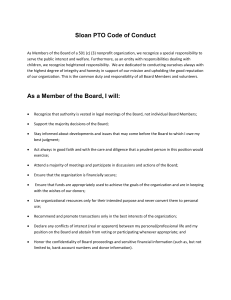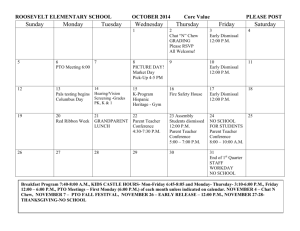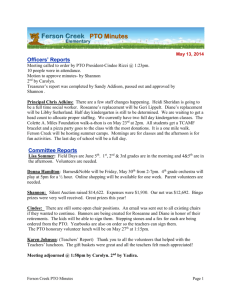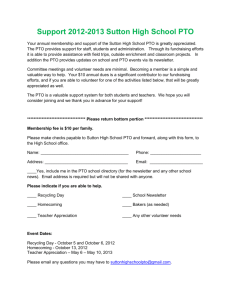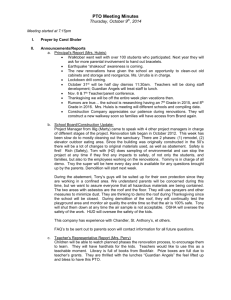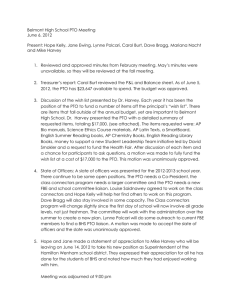Proposed Rule 2.102(c) - American Bar Association
advertisement
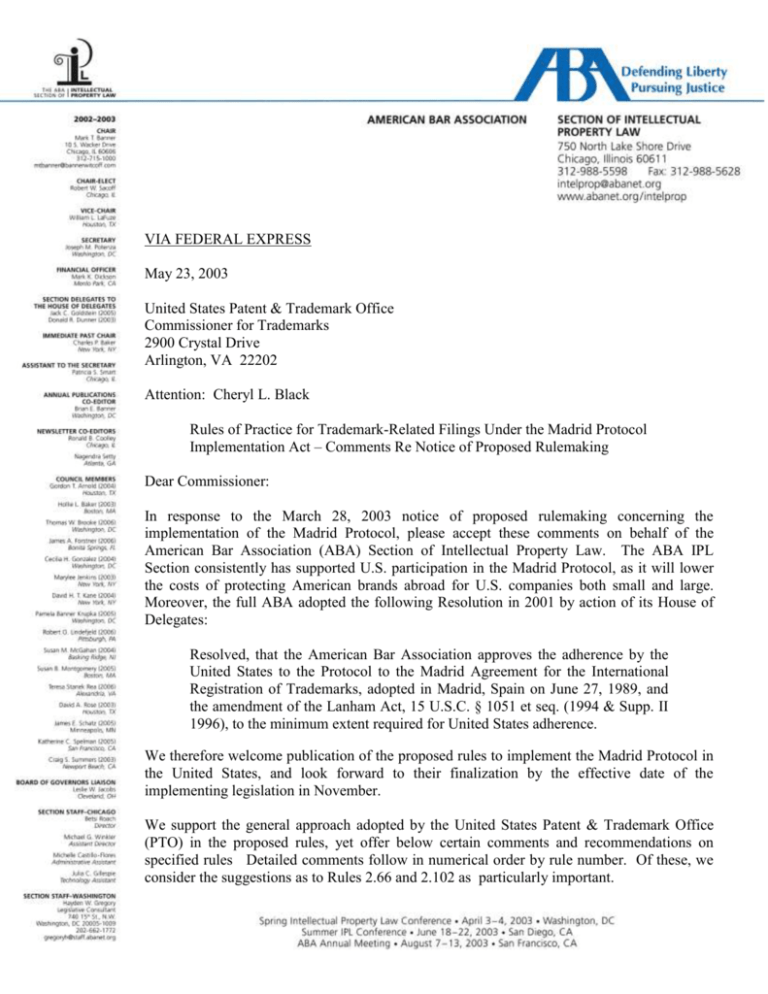
VIA FEDERAL EXPRESS May 23, 2003 United States Patent & Trademark Office Commissioner for Trademarks 2900 Crystal Drive Arlington, VA 22202 Attention: Cheryl L. Black Rules of Practice for Trademark-Related Filings Under the Madrid Protocol Implementation Act – Comments Re Notice of Proposed Rulemaking Dear Commissioner: In response to the March 28, 2003 notice of proposed rulemaking concerning the implementation of the Madrid Protocol, please accept these comments on behalf of the American Bar Association (ABA) Section of Intellectual Property Law. The ABA IPL Section consistently has supported U.S. participation in the Madrid Protocol, as it will lower the costs of protecting American brands abroad for U.S. companies both small and large. Moreover, the full ABA adopted the following Resolution in 2001 by action of its House of Delegates: Resolved, that the American Bar Association approves the adherence by the United States to the Protocol to the Madrid Agreement for the International Registration of Trademarks, adopted in Madrid, Spain on June 27, 1989, and the amendment of the Lanham Act, 15 U.S.C. § 1051 et seq. (1994 & Supp. II 1996), to the minimum extent required for United States adherence. We therefore welcome publication of the proposed rules to implement the Madrid Protocol in the United States, and look forward to their finalization by the effective date of the implementing legislation in November. We support the general approach adopted by the United States Patent & Trademark Office (PTO) in the proposed rules, yet offer below certain comments and recommendations on specified rules Detailed comments follow in numerical order by rule number. Of these, we consider the suggestions as to Rules 2.66 and 2.102 as particularly important. Proposed Rule 2.35(b)(2) After publication, in order to add or substitute the filing basis in Section 1 or 44 applications, the proposed § 2.35(b)(2) requires an applicant to file a petition to the Commissioner. Following the decision in In re Monte Dei Maschi Di Siena, 34 U.S.P.Q.2d 1415 (Comm’r Pats. 1995), the PTO has, as a matter of course, routinely granted such petitions. In view of the clear instruction in In re Monte Dei Maschi Di Siena, and the history of PTO action on such requests since the decision was issued, we believe the time-consuming petition process should be avoided, while bringing about the same result and conserving the resources of both the PTO and the public. Therefore, we recommend that authority to consider and grant post-publication requests to add or substitute a filing basis under Section 1 or 44 be delegated to the Examining Attorneys. We also see no need to republish applications after entry of such an amendment, as in our experience, the public normally does not rely upon the information regarding basis for registration published in the Official Gazette in formulating a decision to oppose registration. Therefore, republication after entry of an amendment under this provision does not provide sufficient public benefit to outweigh the benefit afforded by streamlining the application process. Proposed Rule 2.52 (a)(1) Proposed Rule 2.52(a)(1) appears to adopt the term “standard character” to identify drawings which currently are referred to in U.S. practice as “typed,” i.e., for marks consisting of words or numbers or similar characters exclusively, without any design or special form elements. We recommend clarifying this in the comments accompanying the final rules, noting (a) that the “standard character” drawings are equivalent to “typed” drawings under current practice, and (b) that the legal effect of electing such drawings is to cover the mark in question in any and all manner of style or display. Proposed Rule 2.53(c) Proposed Rule 2.53(c) limits the acceptable electronic format of drawings to the .jpg format only. We recommend revising the rule to afford the PTO the flexibility to accept other formats in appropriate circumstances, without having to amend the rules to do so. Technology changes quickly, and other formats might quickly become more acceptable and convenient. Proposed Rule 2.66(a) This rule is critically important to trademark owners. Proposed Rule 2.66(a) requires the filing of a petition to revive an application within two months of the mailing date of the notice of abandonment. We believe this proposal is too restrictive, in view of both the important rights which may be lost as a result of an abandonment of an application and the processing difficulties historically experienced with PTO issuance and mailing of abandonment notices. The recent amendment of Section 12(b) of the Trademark Act and the Trademark Rules to adopt the “unintentional” standard for reviving unintentionally abandoned applications has provided an essential safety net to trademark owners in maintaining important rights that might otherwise be lost, and the new rules should not impose more stringent requirements for reviving abandoned applications that are not mandated by the Madrid Protocol. Accordingly, we strongly recommend that the language of the current rule be retained, permitting revival upon filing of the petition within two months of obtaining actual knowledge of the abandonment, provided the applicant has demonstrated diligence in monitoring the status of the application. If the language of the current rule is carried over, we would accept the proposed reduction in the “diligence” standard to six months. We also strongly recommend that the authority to consider and act on petitions to revive be delegated to the Examining Attorneys. This delegation of a largely perfunctory function would remove an unnecessary administrative burden from the Office of the Commissioner, and would facilitate the timely processing of applications under the new Madrid time limits. Proposed §§ 2.101 and 2.111 In connection with payment of insufficient fees, both proposed Rule 2.101, relating to filing oppositions, and 2.111, relating to filing cancellations, deny to electronic filers the same flexibility and curability of insufficiencies that is afforded paper filers. This is directly contrary to the PTO's laudable efforts to motivate and promote electronic filing, and not mandated by the Madrid Protocol. We believe the same, more flexible, procedures should be available regardless of the filing method, and therefore urge the PTO to revise this proposed rule accordingly. Proposed Rule 2.102(c) This proposed rule would overhaul the system which now governs extensions of time to oppose all applications for registration in the United States Patent and Trademark Office. We view this proposal as one of most critical in the rules package, and strongly recommend reconsideration. As presently proposed, potential opposers would be permitted to file only two extension requests. Moreover, the total time available for all extensions would be limited to 120 days from the date of publication. Extensions of time to oppose are essential and effective tools for negotiating settlements of disputes and potential disputes, as an alternative to more costly and extensive formal TTAB opposition proceedings. We appreciate that the PTO has decided to establish a uniform system for extension requests, governing both Madrid extensions of protection and traditional applications. We do not oppose a uniform procedure in principle, but we strongly believe the rules should permit the maximum time allowed under Article 5(2)(c)(ii) of the Madrid Protocol for the filing of extensions of time to oppose. Under 5(2)(c)(ii) the PTO must notify the International Bureau of the specific grounds for an opposition “. . . not more than seven months from the date on which the opposition period begins; if the opposition period expires before this time limit of seven months, the notification must be made within a time limit of one month from the expiry of the opposition period.” Accordingly, the proposed rule limiting extensions to 120 days is unnecessarily restrictive, not mandated by Madrid, and should be expanded to 180 days (six months) from publication. Implementation of this recommendation will not impair compliance with PTO notification requirements, because the 30-day notification period would then apply. We also recommend that potential opposers be permitted to file extensions in 30, 60 or 90 day increments, without cost, and with no limit upon the number of extension requests available, so long as the overall time limit is not exceeded. The number of requests should not burden the PTO, in view of the PTO’s plan to handle the filing of such requests electronically. Proposed Rule 7.11 The PTO does not presently “link” application records and assignment records, but we believe it should adopt some mechanism to efficiently resolve discrepancies between owner and address information as between an International Application and the basic application or registration. This would avoid delays and the possible loss of important priority rights as a result of clerical discrepancies. Proposed Rule 7.36 This proposed rule provides for a “grace period” of only 3 months with regard to statements of use to support extensions of protection. We recognize that the rule is dictated by the current statutory language and that legislation will be required to bring this provision into conformity with the 6-month grace period now provided under Sections 8 and 9 of the Trademark Act. We encourage early action with regard to that legislative change. Early Appointment of U.S. Representatives with Regard to Extensions of Protection We also recommend that the PTO and the International Bureau adopt a mechanism to permit an applicant requesting an extension of protection to the United States to designate a representative in the U.S. both at the time of requesting the extension to the United States and after the receipt of the extension request by the PTO. This would facilitate early communication to the applicant’s representative of any objections to registration. Since the PTO must already notify the International Bureau of such objections, simultaneous notification of the pre-designated representative would not impose any substantial burden upon the PTO because such communications will be electronic. We hope the PTO will find these suggestions useful. We look forward to working with the PTO in bringing the Madrid Protocol to successful fruition in the United States with appropriate safeguards to protect the important rights at issue. Respectfully submitted, Robert W. Sacoff

